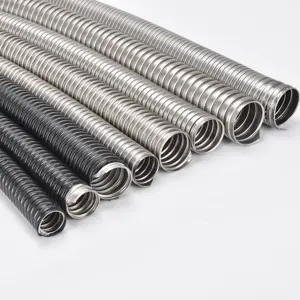Introduction to Underground Flexible Electrical Conduit
Underground flexible electrical conduit is a crucial component in the realm of electrical installations. Designed for durability and adaptability, this conduit plays a vital role in protecting electrical wiring underground. The flexible nature of this conduit allows for easy installation in various landscapes, while its robust construction ensures that the wiring within remains safe from environmental hazards. With its increasing demand in residential, commercial, and industrial applications, understanding the types, functions, features, and advantages of underground flexible electrical conduit is essential for anyone involved in electrical work or planning construction projects.
Types of Underground Flexible Electrical Conduit
There are several types of underground flexible electrical conduit, each designed to meet specific requirements and environmental conditions. Here are the most common types:
- Polyvinyl Chloride (PVC) Conduit: Lightweight and resistant to moisture, PVC conduit is ideal for outdoor installations.
- Flexible Metal Conduit (FMC): Made from spirally wound metal, it offers excellent protection against physical abrasion.
- Liquidtight Flexible Nonmetallic Conduit: This conduit type is designed to prevent water ingress, suitable for wet conditions.
- Rigid Polyvinyl Chloride Conduit: A more rigid version of PVC, offering enhanced protection in areas with potential impact or pressure.
Function and Features of Underground Flexible Electrical Conduit
The functionality of underground flexible electrical conduit is complemented by a variety of features that enhance its usability. Some key functions and features include:
- Protection: Safeguards electrical wiring from physical damage, moisture, and chemical exposure.
- Flexibility: Allows for easy bending and maneuvering around obstacles, facilitating a smoother installation process.
- Durability: Constructed to withstand harsh environmental conditions, ensuring a long service life.
- Lightweight and Cost-Effective: Especially true for PVC conduit, reducing installation costs due to ease of handling.
- Variety of Sizes: Available in multiple diameters to accommodate different wire sizes, ensuring compatibility with various electrical systems.
Applications and Advantages of Underground Flexible Electrical Conduit
The applications of underground flexible electrical conduit are vast, making it prevalent in multiple sectors. Here’s a look at where it can be effectively utilized:
- Residential Installations: Ideal for running electrical lines to outdoor lighting, pools, and garden features.
- Commercial Projects: Commonly used in retail environments for power distribution and network cabling.
- Industrial Settings: Provides protection for wiring systems in factories and plants, where mechanical impacts are prevalent.
- Utility Systems: Essential for utility companies to run power lines and cables for telecommunication safely.
The advantages of using underground flexible electrical conduit include:
- Easy Installation: Its flexible nature allows for quick and simple installations without the need for extensive tools.
- High Resistance: Withstands extreme weather conditions, temperature variations, and chemicals.
- Enhanced Safety: Reduces the risk of electrical hazards by enclosing wires and preventing exposure to the elements.
- Cost-effective: Low maintenance reduces long-term operational costs.

























